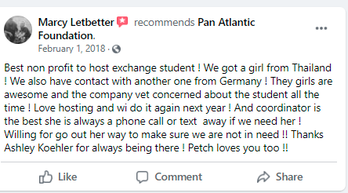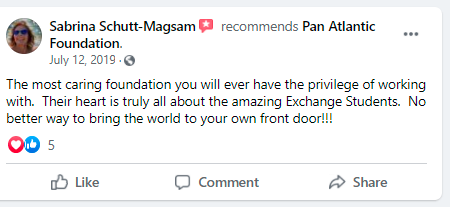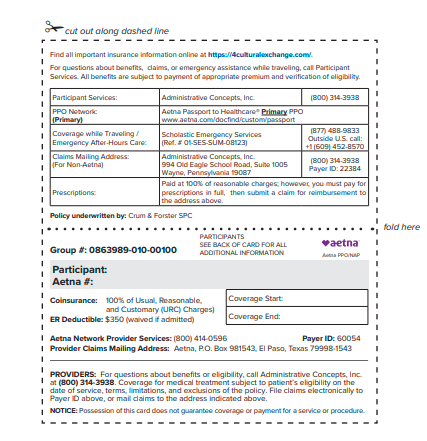Host Family Toolkit
Hello,
Welcome to the Pan Atlantic Foundation. If you are here, then you are probably considering hosting, have hosted, or are currently hosting a student. We have created this toolkit to help answer any question you may have and support you along your journey. Our organization has been built from the ground up with support from volunteer host families. It is families like yours who open their hearts and homes that make what we do possible. There are teens all over the world who have a desire for the American dream. How amazing is it that we get to be a part of making that dream become reality? So join us in making the world a smaller place and #livelifelikeneverbefore!
Sincerely,
Pan Atlantic
Welcome to the Pan Atlantic Foundation. If you are here, then you are probably considering hosting, have hosted, or are currently hosting a student. We have created this toolkit to help answer any question you may have and support you along your journey. Our organization has been built from the ground up with support from volunteer host families. It is families like yours who open their hearts and homes that make what we do possible. There are teens all over the world who have a desire for the American dream. How amazing is it that we get to be a part of making that dream become reality? So join us in making the world a smaller place and #livelifelikeneverbefore!
Sincerely,
Pan Atlantic
First Things First....
|
If you are interested in hosting, you should start your host family application right away. Completing the application does not obligate you to host. It does allow the area representative to share with you comprehensive student applications, pictures, and videos. Until your application is approved we are limited on how much information we can provide on each student.
|
Browse Student ApplicationsYou can now browse students on the Meet Our Students page. Keep in mind that this page is only a sample of our students and your Pan Atlantic area representative has access to all student applications they can work with you to find the student who will best fit your family!
|
24 Hour SupportPan Atlantic Foundation is here to support you all the way.
|
How does Pan Atlantic find students?A student applies to Pan Atlantic Foundation through one of our international partner agencies. We accept only the best, and the selection is thorough and competitive. Applicants are evaluated on academics; grades, teacher references, and English ability. Equally, as important, they and their natural parents are interviewed to ensure that they possess the commitment, motivation, and flexibility necessary to become a part of a new school, a new family, and a new community in a new country.
|
How does Pan Atlantic prepare students for their time in the United States?After a thorough preparation in their home country with their agency Pan Atlantic Foundation provides students with an orientation upon their arrival to the United States. In this orientation the following topics are covered:
|
What level of English will your student have?
Pan Atlantic Foundation students are required to take the ELTiS test and receive a recommendation from their English teacher. English Language Test for International Students (ELTiS), is a widely accepted test of English proficiency for student exchange programs, J1 and F1. The test provides evidence of students' ability to understand and benefit from high school instruction delivered in English.
What should I expect throughout the program as a host ?
- Complete your application and criminal background check (part of the application)
- Your area representative will meet with your family in your home for an in-person interview.
- Your area representative will contact 2 of your 3 references.
- Complete the online host family orientation.
- Your area representative will also meet with you to have an in-person orientation closer to or right after student arrival.
- Prepare for a follow-up visit - The Department of State requires that someone other than your AR or relative visit your home and complete a report. You can read more about your follow-up visit here.
- You and your student should have an in-person or phone conversation with your area representative at the beginning of each month.
- You should expect an in-person visit from your AR at least once per semester.
6 Things to know when hosting a.....
French Student
How do most teens deal with authority?
In school, the teacher is the authority figure. In general, the majority of students respect this authority. Private school students are known to be more respectful of rules and authority in general. There is a hierarchical distance between students and teachers. As far as respect for parental authority is concerned, the French student who decides to go on an international trip is very respectful and conforms to the new rules of the host home. French teenagers are used to having a framework to respect, whether at school or at home.
Electronic usage in their country – do parents care?
Electronic devices are less accessible to young French people. In general, they get the right to have a cell phone later than American children. Social networks are also less used by the general population in France than in North America. Cell phone use is strictly prohibited during school hours. At home, most French households regulate the use of technology. Parents of children in private schools are generally more careful about the negative effects of technology and therefore students may have more restrictions. Outside of places that restrict technology use, the French student is just like any other teenager and likes to be on social networks and chat with their friends online.
What are most teens used to in terms of independence?
French students are quite independent and mature. When they come from urban schools, they are used to going to and from school alone on foot or by bike, and sometimes by scooter (at 14-15 years old). Getting around in the city is not a problem. In terms of studying, French students are autonomous as a result of the French school system which is more rigid and less adaptable to different kinds of learners. They study, are used to homework, and know how to plan their school vacations well enough to get work done. As for their level of autonomy at home, it all depends on the family. If a parent has stayed home, the child will be less independent in preparing meals, cleaning, and doing laundry. However, if both parents work, the child will be used to helping around the house.
Expectations around the home ie, chores, curfew, and house rules compared to their country.
Typically, French children are used to helping the family, especially around meals: setting the table, serving, tidying the table, washing the dishes, and wiping the dishes. French children are also responsible for cleaning up their bedrooms in the vast majority of families. In general, bedtime for a teenager is around 10:00 or 11:00 p.m., although some teenagers who have access to technology may end up going to bed much later.
What is the primary motivation for a French teen to come to the US? English? Resume building for university?
The main motivation for French students to spend a year in the United States is to improve their English. They want to be bilingual (trilingual for some), are open to the world, and understand that English is a significant advantage for their future, both for travel and for their career plans. For many French students, American life is also a dream: to experience the American educational system with clubs, sports, cheerleading, prom...! French students want to live this experience because many hope to one day live in the United States.
In Addition-
In France, the family and time spent with the family is highly valued. Often, French students are destabilized by the after-school family schedule: everyone makes their own meal, everyone eats at their own time, television is more present, etc. The French student may feel left behind by this lifestyle.
Cultural activities are also part of French family's reality (often on a weekly basis): going to the museum, going to the movies, going to see a play, walking in a park, etc. In France, many activities are free or inexpensive for children.
In school, the teacher is the authority figure. In general, the majority of students respect this authority. Private school students are known to be more respectful of rules and authority in general. There is a hierarchical distance between students and teachers. As far as respect for parental authority is concerned, the French student who decides to go on an international trip is very respectful and conforms to the new rules of the host home. French teenagers are used to having a framework to respect, whether at school or at home.
Electronic usage in their country – do parents care?
Electronic devices are less accessible to young French people. In general, they get the right to have a cell phone later than American children. Social networks are also less used by the general population in France than in North America. Cell phone use is strictly prohibited during school hours. At home, most French households regulate the use of technology. Parents of children in private schools are generally more careful about the negative effects of technology and therefore students may have more restrictions. Outside of places that restrict technology use, the French student is just like any other teenager and likes to be on social networks and chat with their friends online.
What are most teens used to in terms of independence?
French students are quite independent and mature. When they come from urban schools, they are used to going to and from school alone on foot or by bike, and sometimes by scooter (at 14-15 years old). Getting around in the city is not a problem. In terms of studying, French students are autonomous as a result of the French school system which is more rigid and less adaptable to different kinds of learners. They study, are used to homework, and know how to plan their school vacations well enough to get work done. As for their level of autonomy at home, it all depends on the family. If a parent has stayed home, the child will be less independent in preparing meals, cleaning, and doing laundry. However, if both parents work, the child will be used to helping around the house.
Expectations around the home ie, chores, curfew, and house rules compared to their country.
Typically, French children are used to helping the family, especially around meals: setting the table, serving, tidying the table, washing the dishes, and wiping the dishes. French children are also responsible for cleaning up their bedrooms in the vast majority of families. In general, bedtime for a teenager is around 10:00 or 11:00 p.m., although some teenagers who have access to technology may end up going to bed much later.
What is the primary motivation for a French teen to come to the US? English? Resume building for university?
The main motivation for French students to spend a year in the United States is to improve their English. They want to be bilingual (trilingual for some), are open to the world, and understand that English is a significant advantage for their future, both for travel and for their career plans. For many French students, American life is also a dream: to experience the American educational system with clubs, sports, cheerleading, prom...! French students want to live this experience because many hope to one day live in the United States.
In Addition-
In France, the family and time spent with the family is highly valued. Often, French students are destabilized by the after-school family schedule: everyone makes their own meal, everyone eats at their own time, television is more present, etc. The French student may feel left behind by this lifestyle.
Cultural activities are also part of French family's reality (often on a weekly basis): going to the museum, going to the movies, going to see a play, walking in a park, etc. In France, many activities are free or inexpensive for children.
German Student
How do most teens deal with authority? German teens have respect towards adults but also expect to be treated like an adult – meaning they expect to be involved in decision-making (especially when it involves themselves). It is common in Germany that for example a curfew is discussed on the occasion and that a compromise is found that works for everyone. German teens learn in school to build and stand up for their opinions. They therefore also have a hard time accepting a simple “no” for an answer without an explanation. They do accept a “no” when they can understand the reasoning behind it.
In addition, Germans are quite open and frank in what they are saying. So German teens are used to that as well. They need to be addressed clearly and directly, or else they might take something rather as a well-meant suggestion rather than an instruction.
In conversations, Germans tend to add a “mhm” or “okay” every now and then – this is not a sign of disinterest or disrespect! On the contrary, it is a sign of listening, comprehension, and respect.
Electronic usage in their country – do parents care? Smartphones are part of (almost) every teenager’s life here in Germany. It is used mainly for social interaction, either in direct contact with peers or by being on social media. Whether or not parents care (or how much they care) is different in each family, but the general consensus seems to be that German parents would prefer their children to spend more time away from their electronic devices, but also don’t really feel too comfortable restricting “screen time” generally as it is a common way of social interaction and they don’t want their children to miss out on anything.
What are most teens used to in terms of independence? German teens are used to lots of independence. Especially in more urban areas, teenagers are used to using public transportation by themselves or taking a bike, so don’t usually have to involve their parents to get to places. Parents are hardly involved in their social life, meaning parents don’t necessarily want to meet their child’s friends, but rather let them make their own decision about whether or not someone is a good person to hang out with. German parents also don’t usually know where their child is at all times as long as they stick to the agreed curfew.
Also in regards to school, many German teenagers don’t involve their parents too much, but rather make sure themselves that school work is done (or not in some cases) and when it is done.
However, there is quite little independence to be seen in German teenagers when it comes to things like doing their own laundry, preparing their own food for school, making sure they have everything they need for school after the summer break, and things like that. Those are aspects where many German teenagers completely rely on their parents.
Expectations around the home ie, chores, curfew, and house rules compared to their country.
There are not too many expectations German parents have for their teenagers around the home. We tend to call it “help when needed”. German teenagers are not necessarily used to having a schedule of chores that everyone does around the home, but rather step in when something needs to be done. This however mainly refers to setting and cleaning the table and filling or emptying the dishwasher. It is very common that parents take care of the children’s laundry and German teenagers rarely help with cleaning the bathroom(s) or the living area(s). They are expected to keep their room tidy though.
There is also usually no set of house rules that are put up on the fridge, for example, but rather common aspects agreed upon over time that everyone is aware of.
Curfews are discussed upon the occasion.
What is the primary motivation for a German teen to come to the US? English? Resume building for university? The primary motivation for German teens to go to the US is because they want to experience the high school spirit, which we don’t have here. They also want to compare what they have seen in movies and on TV to reality, not only related to school but also to everyday life and holidays. They want to learn more about the American culture. Another big reason for an exchange year in the US is to improve their English. There are rarely academic reasons or the goal of resume building for German teens. They much rather want to experience that school can be fun and something you can identify with. In Germany, students usually follow a set curriculum with not too many options/classes to choose from, so that is something they look forward to.
In Addition-
The main expectation of a German student is to be placed in a family where they feel they “fit in”, for example through common interests, and where they feel that the family specifically picked them after going through their student application.
When it comes to support, it is important to keep in mind that German teenagers very frankly say if they don’t like something – not necessarily to blame someone or make someone feel bad, but rather to change and improve the situation and make themselves heard. The best way to support German teenagers is usually to have open conversations with them, to involve them in the process, and not to confront them with a fait accompli or leave them hanging waiting for information.
German exchange students are often afraid that the AR will take the host family’s side automatically or pass on every information the student gives the AR right to the host family, even if told in confidence. So making sure that the student has trust in the AR for example through regular contact throughout the year, is important.
In addition, Germans are quite open and frank in what they are saying. So German teens are used to that as well. They need to be addressed clearly and directly, or else they might take something rather as a well-meant suggestion rather than an instruction.
In conversations, Germans tend to add a “mhm” or “okay” every now and then – this is not a sign of disinterest or disrespect! On the contrary, it is a sign of listening, comprehension, and respect.
Electronic usage in their country – do parents care? Smartphones are part of (almost) every teenager’s life here in Germany. It is used mainly for social interaction, either in direct contact with peers or by being on social media. Whether or not parents care (or how much they care) is different in each family, but the general consensus seems to be that German parents would prefer their children to spend more time away from their electronic devices, but also don’t really feel too comfortable restricting “screen time” generally as it is a common way of social interaction and they don’t want their children to miss out on anything.
What are most teens used to in terms of independence? German teens are used to lots of independence. Especially in more urban areas, teenagers are used to using public transportation by themselves or taking a bike, so don’t usually have to involve their parents to get to places. Parents are hardly involved in their social life, meaning parents don’t necessarily want to meet their child’s friends, but rather let them make their own decision about whether or not someone is a good person to hang out with. German parents also don’t usually know where their child is at all times as long as they stick to the agreed curfew.
Also in regards to school, many German teenagers don’t involve their parents too much, but rather make sure themselves that school work is done (or not in some cases) and when it is done.
However, there is quite little independence to be seen in German teenagers when it comes to things like doing their own laundry, preparing their own food for school, making sure they have everything they need for school after the summer break, and things like that. Those are aspects where many German teenagers completely rely on their parents.
Expectations around the home ie, chores, curfew, and house rules compared to their country.
There are not too many expectations German parents have for their teenagers around the home. We tend to call it “help when needed”. German teenagers are not necessarily used to having a schedule of chores that everyone does around the home, but rather step in when something needs to be done. This however mainly refers to setting and cleaning the table and filling or emptying the dishwasher. It is very common that parents take care of the children’s laundry and German teenagers rarely help with cleaning the bathroom(s) or the living area(s). They are expected to keep their room tidy though.
There is also usually no set of house rules that are put up on the fridge, for example, but rather common aspects agreed upon over time that everyone is aware of.
Curfews are discussed upon the occasion.
What is the primary motivation for a German teen to come to the US? English? Resume building for university? The primary motivation for German teens to go to the US is because they want to experience the high school spirit, which we don’t have here. They also want to compare what they have seen in movies and on TV to reality, not only related to school but also to everyday life and holidays. They want to learn more about the American culture. Another big reason for an exchange year in the US is to improve their English. There are rarely academic reasons or the goal of resume building for German teens. They much rather want to experience that school can be fun and something you can identify with. In Germany, students usually follow a set curriculum with not too many options/classes to choose from, so that is something they look forward to.
In Addition-
The main expectation of a German student is to be placed in a family where they feel they “fit in”, for example through common interests, and where they feel that the family specifically picked them after going through their student application.
When it comes to support, it is important to keep in mind that German teenagers very frankly say if they don’t like something – not necessarily to blame someone or make someone feel bad, but rather to change and improve the situation and make themselves heard. The best way to support German teenagers is usually to have open conversations with them, to involve them in the process, and not to confront them with a fait accompli or leave them hanging waiting for information.
German exchange students are often afraid that the AR will take the host family’s side automatically or pass on every information the student gives the AR right to the host family, even if told in confidence. So making sure that the student has trust in the AR for example through regular contact throughout the year, is important.
Mexican Student
How do most teens deal with authority?
Most teens are used to following rules at home and at school. They are usually respectful and understanding.
Electronic usage in their country – do parents care?
In general, like most teenagers, they enjoy spending time on social networks communicating and exchanging with friends, however, it is common for parents to set limits on the amount of time used. We expect the American Family to set limits.
What are most teens used to in terms of independence?
They are usually quite independent people in fulfilling their school obligations and chores at home, and also dealing with problems that are in their hands to solve; otherwise, they will certainly seek advice and guidance.
Expectations around the home ie, chores, curfew, and house rules compared to their country.
They expect a friendly environment, coexistence, and cultural exchange. They tend to be adaptable people who appreciate cultural differences. Mexican teenagers are used to big and close families where the chores at home are shared between all the members and usually parents ask them not to get home late. Mexican parents always set rules in the house to maintain harmony.
What is the primary motivation for a Mexican teen to come to the US? English? Resume building for university?
Mexican teen's main motivation usually is improving their English skills and while doing so, validating their High School year. They know English can offer great opportunities for the future and it also represents a window for the intercultural exchange in which Mexicans, as friendly and curious people, are really interested in.
In Addition-
Students of Mexico come from a middle class, students who pick this program have hard-working parents who normally appreciate education, the students are prepared to work hard and display at school they can cope.
When accepting a host family, the Mexican student expects to treat them like a second family and would like to create a bond that would last forever.
How do most teens deal with authority?
Most teens are used to following rules at home and at school. They are usually respectful and understanding.
Electronic usage in their country – do parents care?
In general, like most teenagers, they enjoy spending time on social networks communicating and exchanging with friends, however, it is common for parents to set limits on the amount of time used. We expect the American Family to set limits.
What are most teens used to in terms of independence?
They are usually quite independent people in fulfilling their school obligations and chores at home, and also dealing with problems that are in their hands to solve; otherwise, they will certainly seek advice and guidance.
Expectations around the home ie, chores, curfew, and house rules compared to their country.
They expect a friendly environment, coexistence, and cultural exchange. They tend to be adaptable people who appreciate cultural differences. Mexican teenagers are used to big and close families where the chores at home are shared between all the members and usually parents ask them not to get home late. Mexican parents always set rules in the house to maintain harmony.
What is the primary motivation for a Mexican teen to come to the US? English? Resume building for university?
Mexican teen's main motivation usually is improving their English skills and while doing so, validating their High School year. They know English can offer great opportunities for the future and it also represents a window for the intercultural exchange in which Mexicans, as friendly and curious people, are really interested in.
In Addition-
Students of Mexico come from a middle class, students who pick this program have hard-working parents who normally appreciate education, the students are prepared to work hard and display at school they can cope.
When accepting a host family, the Mexican student expects to treat them like a second family and would like to create a bond that would last forever.
Spanish Student
Coming soon.
Italian Student
Coming soon.
Danish Student
Coming Soon.
Resources
- Student Handbook
- US Department of State Regulations
- Best Practices and Strategies for Cross Cultural Interactions
- Teen Sexual Assault: Information for Teens
- Identifying and Reporting Sexual Harassment
- Host Family Tax Deduction - IRS Charitable Contribution paf_irs_form.pdf
- Student Insurance Information
Hear it from these Host Dads
|
|
|
Frequently Asked Questions
What does it mean to be a Host Family?
To be a host family is to agree to welcome a high school foreign exchange student into your home, to live as part of your family while they attend your local high school, for anywhere from a few weeks to 10 months! At Pan Atlantic Foundation, we guide and support you through this process from start to finish!
What is Pan Atlantic Foundation?
Pan Atlantic Foundation is a non-profit organization designated by the U.S. Department of State to sponsor high school foreign exchange students to spend an academic semester or year in the United States. We are a small organization, providing the personal and thoughtful support that our community of host families, students, and representatives deserve! We are all united in our mission to make the world a friendlier place, and at Pan Atlantic, you will quickly feel like part of our growing family!
How do I get accepted as a host family?
Families interested in hosting are guided through the process by a local area representative in their community. The screening includes a home visit, an in-person interview, an online application, and a background check. Click here if you are ready to get started!
Does a family receive compensation for hosting a Pan Atlantic Foundation student?
No, they do not. Per Department of State regulation, students who travel on J1 visas are required to be placed with volunteer host families. However, families do qualify for a $50 a month tax deduction. Read more
What are my primary responsibilities as a host family?
Pan Atlantic Foundation host parents are volunteers who must be at least 25 years old and able to provide the following:
- A welcoming home for a student for either one or two semesters
- Family support
- A bedroom and a bed (students can share rooms with children of the same gender within four years of his/her age)
- An appropriate place to study
- Meals at home and school. However, if a student chooses to purchase a school lunch, it is at their own expense.
- Assistance coordinating appropriate transportation
Do I get to choose my student?
Once you have been accepted as a Pan Atlantic Foundation host family, your area representative will share with you the profiles of students in need of a host family in your area. Together, you and your area representative will select a student who will be a good fit for your family's interests and lifestyle.
Are the students allowed to participate in after-school activities?
Yes. They are allowed and encouraged to participate in sports and school activities.
Are the students allowed to drive?
Students are not allowed to drive. However, they are allowed to ride with friends and take public transportation.
How long is the student’s stay?
Students stay for either one semester or two semesters.
Is there a tax deduction for the host family?
Yes, the current deduction is $50 a month.
Will my student come with his/her own spending money?
Yes - the students bring between $150-$250 a month to cover things such as school fees, clothing, entertainment, mobile phones, and/or any other personal items they might need to purchase.
When can I expect my student to arrive?
Student arrivals are typically coordinated with the host family's availability and school start dates. Most students arrive the week before the first day of school.
When does my student have to leave?
Students must depart within two weeks of the school's end date.
Will I, as the host family, be in contact with my Area Representative throughout the year?
Yes. Your Area Representative is there to support you and your student throughout the entire experience! They will be in contact with you, at least once a month, but are available any time you have questions.
What happens if the placement doesn’t work out?
Pan Atlantic Foundation is there to support your successful experience, in any way possible. But, if for some reason, after working with you and your student, it becomes evident that it is not a mutually positive situation, Pan Atlantic Foundation and your area representative will begin work to secure a new host family for the student.
Is Pan Atlantic Foundation a non-profit organization?
Pan Atlantic Foundation is a non-profit organization. This means that we are a 501(c)(3) organization, recognized by the Internal Revenue Service.
What kind of visa do the students receive?
Our students travel on a J1 Visa sponsored by the Department of State.
|
|
Not able to host but still want to help? Refer a family today! |
Personal Reviews
Student Insurance
|
Students have Aetna Passport to Healthcare Primary PPO
To find an Aetna provider visit www.aetna.com/docfind/custom/passport Insurance Claims should be mailed to Administrative Concepts, Inc. 994 Old Eagle School Road, Suite 1005 Wayne, Pennsylvania 19087 Fax: (610) 293-9299 Please Note-
|
Prescriptions
When a student receives a prescription they will need to pay for that prescription upfront. However, a claims form can be completed and sent to the insurance company for reimbursement.
1. Make sure your student keeps the itemized bill/prescription. It will list the Rx and the price of each Rx.
2. Print, complete, and sign the Insurance Claim Form
3. Mail or e-mail the claim form within 60 days of the medical visit.
4. Have the student keep all copies until their reimbursement is received.
Insurance Issues
For any insurance related issues , please fill out our online form and a member of our PAF team will reach out to assist you promptly.
When a student receives a prescription they will need to pay for that prescription upfront. However, a claims form can be completed and sent to the insurance company for reimbursement.
1. Make sure your student keeps the itemized bill/prescription. It will list the Rx and the price of each Rx.
2. Print, complete, and sign the Insurance Claim Form
3. Mail or e-mail the claim form within 60 days of the medical visit.
4. Have the student keep all copies until their reimbursement is received.
Insurance Issues
For any insurance related issues , please fill out our online form and a member of our PAF team will reach out to assist you promptly.






